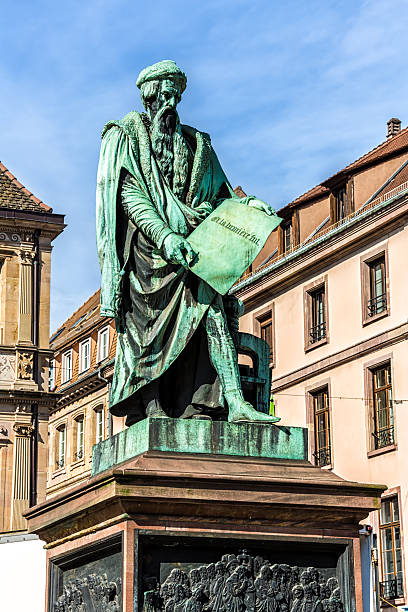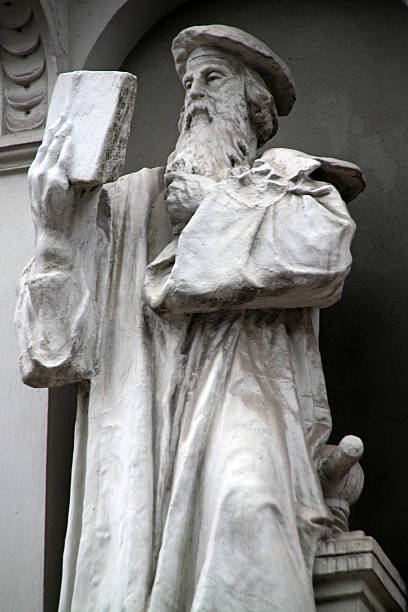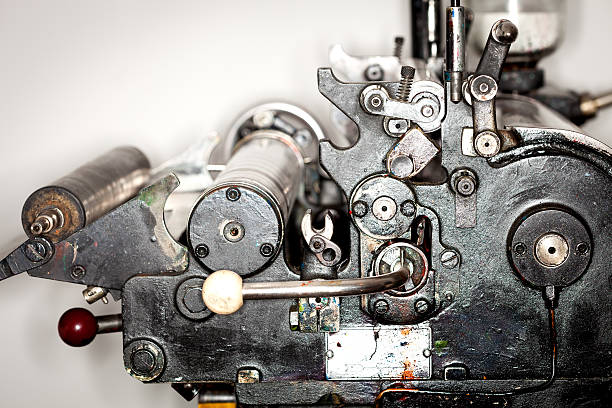Introduction
Johannes Gutenberg is undoubtedly one of the most influential figures in the history of modern civilization. His invention of the printing press in the 15th century revolutionized the way information was disseminated and paved the way for the modern media industry. This essay explores the contribution of Johannes Gutenberg to modern civilization and the impact his invention continues to have on the world today, the man is none other than Johannes Gutenberg.
The invention of the printing press was a game-changer for society as it facilitated the spread of knowledge and information on a scale no one could have imagined. Prior to Gutenberg’s invention, writing was a tedious and laborious task that required an enormous amount of time to reproduce a single manuscript. The printing press, on the other hand, made it possible to produce multiple copies of a manuscript in significantly less time with a fraction of the effort. The efficiency of the printing press increased the number of books available for reading and enabled the public to gain access to knowledge about a range of subjects, from science to religion and politics.
One of the most significant contributions of the printing press was the democratization of knowledge. The ability to produce books cheaply and widely available allowed people of all backgrounds to access information that was previously reserved for the privileged few. This led to an increase in literacy rates as well as the development of critical thinking skills among the masses. The spread of knowledge also fueled the Renaissance, a period of great intellectual growth and advancement in Europe.

Moreover, the printing press made it possible for scientific discoveries to be shared and disseminated in a way that had never been possible before. Prior to Gutenberg’s invention, scientific discoveries were shared verbally or in written manuscripts that were copied by hand. The printing press made it possible to disseminate scientific knowledge on a scale never before seen, leading to the acceleration of scientific progress and the development of new scientific disciplines.
Gutenberg’s invention also revolutionized the world of publishing and journalism. The printing press allowed for the rapid production of newspapers and magazines, which enabled the spread of news and information across large regions. This led to the development of the modern media industry, which has played an essential role in shaping public opinion and promoting democratic values.
In addition to facilitating the spread of knowledge, the printing press also played a critical role in the development of the Protestant Reformation. The ability to produce materials quickly and cheaply made it possible for Protestant ideas to be disseminated widely and rapidly, leading to the establishment of the Protestant Church as a significant religious movement.
Gutenberg’s invention also had a significant impact on education. Prior to the printing press, education was only available to the elite. The ability to produce books cheaply and widely available made education accessible to all, leading to an increase in literacy rates and the development of critical thinking skills. This, in turn, paved the way for the development of modern education systems, which have played an essential role in shaping modern civilization.
The printing press also played a critical role in the development of the modern entertainment industry. Prior to Gutenberg’s invention, books were a luxury item, and only the wealthy could afford them. The ability to produce books cheaply and widely available made it possible for literature to become a mainstream form of entertainment, laying the foundation for the development of the modern publishing and entertainment industries.
Moreover, the printing press also had a significant impact on the global economy. The ability to produce books cheaply and efficiently increased the demand for paper, which led to the development of the paper industry. The printing press also created a significant demand for printers and ink, leading to the establishment of new industries.
Lastly, Gutenberg’s invention paved the way for the development of the modern information age. The printing press made it possible to disseminate information on a scale that had never been seen before, leading to the development of modern communication technologies such as the Internet and social media. Gutenberg’s invention continues to be a significant force in driving innovation and technological advancement in the 21st century.

How Has Johannes Gutenberg Influenced Invention Today?
Johannes-Gutenberg is one of the most celebrated inventors in history. He is mostly known for the invention of the printing press which was a game-changer in the history of publishing, communication, and education. Gutenberg was a visionary who developed a machine that could print books in volumes, making them more accessible and cost-effective. His invention has had a profound impact on the world, and his legacy continues to thrive in almost every aspect of modern-day life. This essay aims to analyze how Johannes Gutenberg has influenced invention today, with particular attention to its evolution, impact, and adaptation.
Gutenberg’s invention of the printing press in 1440 marked the beginning of the age of mass communication. Before the printing press, books and other printed documents were copied by hand, a process that was time-consuming, expensive, and prone to errors. Gutenberg’s invention brought a revolution in printing, making it possible to replicate books on a large scale at an affordable price.
This development democratized knowledge, making it accessible to many people for the first time. The invention of the printing press led to a political, cultural, and scientific revolution, with knowledge spreading at an unprecedented pace.
Johannes Gutenberg’s invention of the movable type printing press changed the way publishing worked. This machine allowed printers to move pieces of metal containing letters around on a plate that could be used to make prints of that page. This meant it was much quicker to produce pages for books, making publishing much faster and easier. Today, the printing press has been replaced by digital presses, which have taken automation to a new level.
The replacement of traditional presses with digital presses has resulted in faster turnaround times, improved print quality, and lower printing costs. Modern-day printing techniques are much quicker and deliver higher quality prints that are more affordable than ever before.
The printing press that Johannes Gutenberg invented was a labor-intensive machine that required many hours of manual labor to operate. Today, technological advancements have led to highly automated printing presses that can produce thousands of ISBN-standard books in a single day. From uploading files to pre-flight production, contemporary print production has become much more streamlined. Automation has allowed printing to become much more of a fine-tuned art, with printers who can run presses with a few keystrokes.
Johannes-Gutenberg’s printing press allowed for the preservation of knowledge, making it easier to preserve and store books and other works for future generations, thus allowing them to understand the development of history. Today, digitization has taken the concept of preservation of knowledge to a new level. With the growth of the Internet, electronic books (e-Books) has become popular, providing access to an unprecedented amount of information. Electronic libraries and book archives have been created, allowing anyone with an Internet connection to access millions of books in the public domain. Electronic books have become an important tool for disseminating knowledge, as they are easy to read, edit, and share, while providing vast amounts of information that a traditional printed book cannot.

The printing press permitted copies of the same work to be available in more than one location, thus eliminating the need to physically transport original documents and reducing the risk of damage and theft. Thanks to the advancement of technology, digital sharing of documents has become easier due to the availability of high-speed internet. This development has allowed for real-time editing and sharing of documents. Cloud computing allows documents to be stored in a centralized location accessible to multiple people who can edit them remotely. Digital sharing has revolutionized collaboration, making it more efficient, cost-effective, and faster.
Johannes-Gutenberg’s printing press paved the way for the industrial revolution. The printing press inspired other inventors, who, in turn, contributed to the overall development of industrialization. The industrial revolution was a period of great innovation and growth that led to advancements in science, medicine, transportation, and communication. Today, we still see this legacy of Johannes Gutenberg in modern technology, with countless inventions in the digital space.
In the current era of digital communication, social media has become the most efficient and cost-effective way of disseminating information, knowledge, and ideas. Social media platforms like Facebook, Twitter, and Instagram allow users to create, publish, and share any form of content with a vast audience across many different locations. Print advertising has been replaced by online marketing, and for good reason. Social media is much cheaper, can reach a bigger targeted audience and is quite efficient. Social media platforms have revolutionized marketing, making it more accessible, faster, and cost-effective.
Conclusion
In conclusion, Johannes-Gutenberg’s invention of the printing press was a pivotal moment in the history of modern civilization. His contribution has transformed the world in countless ways, from increasing access to education and knowledge to revolutionizing the global economy. His invention laid the foundation for the development of much of the technology that drives innovation and progress in the 21st century. Without Gutenberg’s invention, modern civilization as we know it would be unrecognizable.

3 thoughts on “The Contribution of Johannes Gutenberg To Modern Civilization In 2000s”